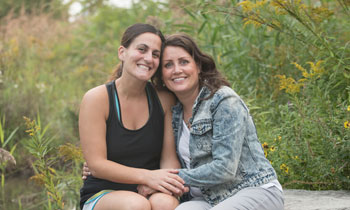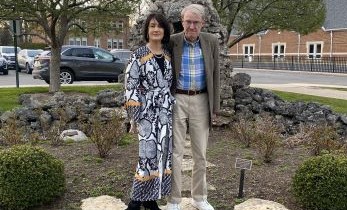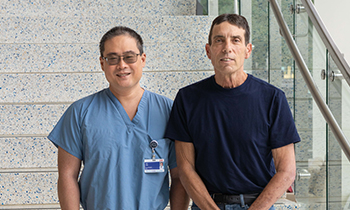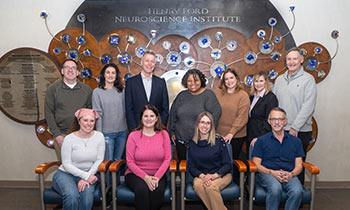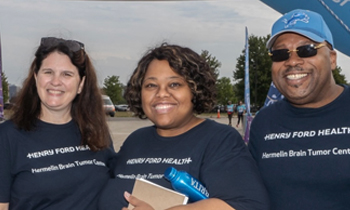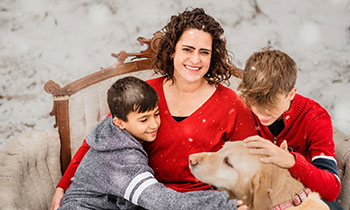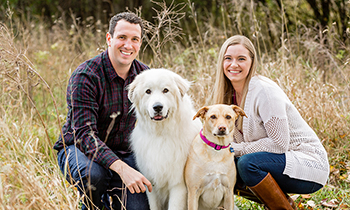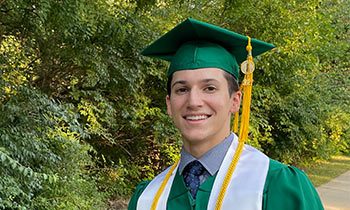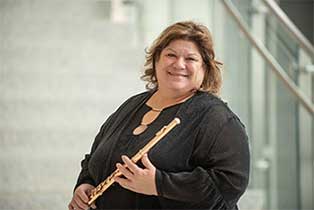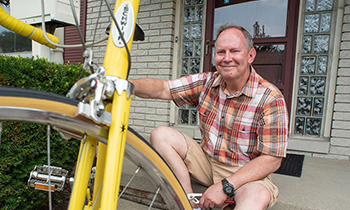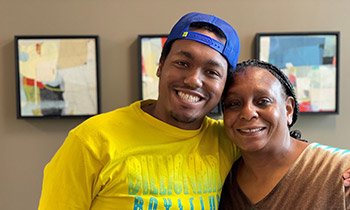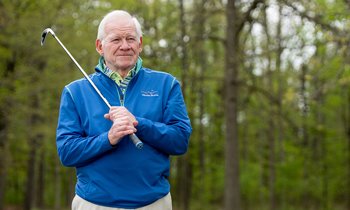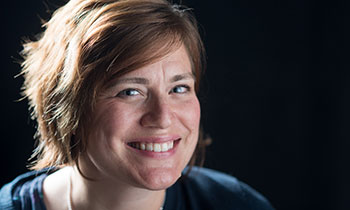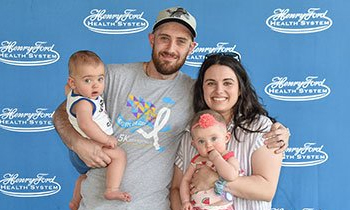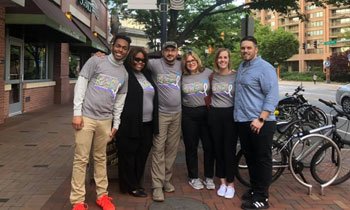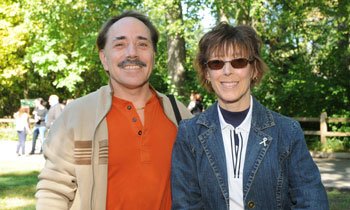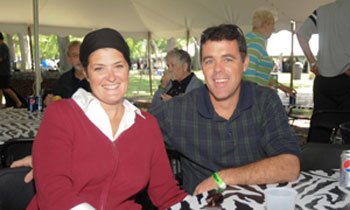Brain Tumor Patient Stories
For over a decade, the Hermelin Brain Tumor Center has delivered hope to thousands of brain tumor patients. Through leadership in the development of novel treatments, investment in technology that improves diagnosis and treatment, and exemplary clinical care and research, this center has established itself as one of the leading facilities in the country. This also includes increased research and clinical focus on defining imaging changes as well as the diagnosis and treatment of the side effects of the treatments themselves including radiation necrosis.
Seeing patients from around the world, this Center is recognized as one of the busiest in the country. In addition to offering patients advanced clinical treatment, the unique approach of the Hermelin Brain Tumor Center allows physicians and nurses from all specialties to collaborate on each case, providing customized care for each patient and outcomes that rank among the best in the world.
Sasha and Danielle's story
Most glioblastomas occur in men over the age of 60, so when 20-year-old Danielle Gillespie discovered she had one, she and her doctors were surprised. Even more surprising? Just six weeks earlier, 28-year-old Sasha Archer had come to Henry Ford with a glioblastoma too.
Mindy & Gary's Story
When both Mindy Naumann and her father, Gary, were faced with the devastating diagnoses of brain tumors and various cancer, they put their trust in Henry Ford Health to guide them through the fight. Mindy sought out the “best in the field” where she was finally provided a diagnosis of Oligodendroglioma, while her father Gary was up against melanoma that had metastasized.
Caroline's Story
For 18 years of my life, I lived in good health – I had never even broken a bone. So when I was diagnosed with a brain tumor during my freshman year of college, my world was turned upside down.
Ken's Story
In 2019 Ken Gipfert was diagnosed with stage 4 cancer that metastasized from his lung to his brain. After undergoing surgery to remove the brain tumor and one-third of his lung, his brain tumor recurred three other times. With the help of Henry Ford’s advanced technology, GammaTiles, and innovative experts, Dr. Salim Siddiqui, Ken Gipfert is now remarkably stable after five years of being diagnosed.
Patient Family Advocacy Group
Patients and family members are breaking the isolation of brain cancer as they make noteworthy changes in healthcare. For the last five years, members of the Patient Family Advocacy Group (PFAC) have been advising the Henry Ford team about ways to improve clinic performance and help other patients. The unifying factor of PFAC members is the desire to help those suffering from cancer.
Nestelynn's story
Nestelynn was in the prime of her life three years ago when she begin experiencing a headache that wouldn't go away. She thought the headache was brought on by extreme stress at work, but decided to go the emergency room at Henry Ford Hospital to be safe.
Traci's Story
After nurse practitioner Traci Van Gorden had a small seizure, she went to Henry Ford. Expert neurosurgeons successfully removed a large deep-brain tumor, preserving her life and motor-function and vision.
Janae's Story
Janae Nelson, a 29-year-old speech and language pathologist, had a lot going for her. She was planning her wedding and a honeymoon to Scotland and Ireland when COVID hit. Her recovery was slow, and some symptoms were odd. Instead of a trip to Europe, all roads would lead her to Henry Ford and the neurosurgery team that would save her life. After an awake craniotomy, she has hope for her future.
Nick’s Story
While working at a construction site during summer vacation, Nick stopped dead in his tracks, experiencing weird visuals and sounds. He would soon learn he had a brain tumor in the right posterior parietal lobe. A few months after Nick’s surgery to remove his tumor, completely new diagnostic codes became available for doctors. The new diagnostic codes were based on research done at Henry Ford Health, which completely defined Nick’s uncommon condition.
Diane’s Story
Diane was shocked to learn she had lung cancer that had metastasized to her brain. After passing out while eating lunch one day, Henry Ford Surgeons removed a golf-ball sized tumor from her brain. She would find a highly experienced medical team that determined an ALK biomarker in Diane’s DNA and offered her hope.
Tom's story
As a quality control manager for U.S. Steel, Tom Kremm is diligent, following routines and specifications. But at Henry Ford, his treatment for a deep-brain tumor was more than routine. His team of precision-oriented cancer experts did what would have been impossible just years ago. They killed the cancer.
Austen's story
Prior to Austen discovering he had a tumor on his brain steam known as Diffuse Intrinsic Pontine Glioma, he wanted to be a doctor and improve the health of his community in Detroit. "I realized that I had the same goal after my treatment was over. I knew that this was my calling after winning the fight against a brain tumor."
Stephen's story
At age 55 in 2002, melanoma was removed from Stephens knee. The Melanoma grew back as a lump and invaded several lymph nodes along Stephen’s thigh. These were removed in 2010 to prevent the spread of cancer. Life was good for many years -but on a July evening in 2014 after playing golf, he suddenly couldn’t talk. An ambulance sped him to a nearby hospital where an MRI showed a brain tumor.
Brain Cancer Beacon
Molly Marco never thought that she would hear “you have brain cancer,” – especially at 36 years old. Diagnosed with grade 3 anaplastic astrocytoma in the summer of 2016, she finds power in speaking and writing about her story – and she does so in complete honesty.
Andrew's Story
Andrew Tobin fights glioblastoma while working full time and raising twins, using Optune®️—an FDA-approved wearable device that delivers tumor-treating electric fields to slow aggressive brain cancer growth.
Kate's Story
Kate White had suffered from stress-related headaches her whole life, but the persistent pain she had been feeling for more than two-weeks was signaling a larger problem. The pain became worse and the next thing she remembers is waking up at Henry Ford Hospital with no memory of how she had gotten there – diagnosed with a glioblastoma.
Head to the Hill Advocacy Day
Five patients from the Henry Ford Hermelin Brain Tumor Center and Dr. James Snyder, neurology specialist, met in Washington, D.C., as part of the annual Head to the Hill advocacy day to persuade elected officials to delegate more funding to brain cancer research.
Kim's story
It was a weekday morning in October 2001. Kim Zuchorra began experiencing "weird" symptoms such as vertigo and numbness in her left leg. As a busy mother of two, she did not have time to go to a doctor. So, she ignored these signs. But, her symptoms continued.
Lisa's story
"I was about to go to church with my family and I started stuttering. Then, I blacked out. The next thing I knew I was in an ambulance." These were Lisa Starr's first symptoms of a brain tumor - one that took up nearly twenty-five percent of her brain.
.svg?iar=0&hash=F6049510E33E4E6D8196C26CCC0A64A4)

/hfh-logo-main--white.svg?iar=0&hash=ED491CBFADFB7670FAE94559C98D7798)
